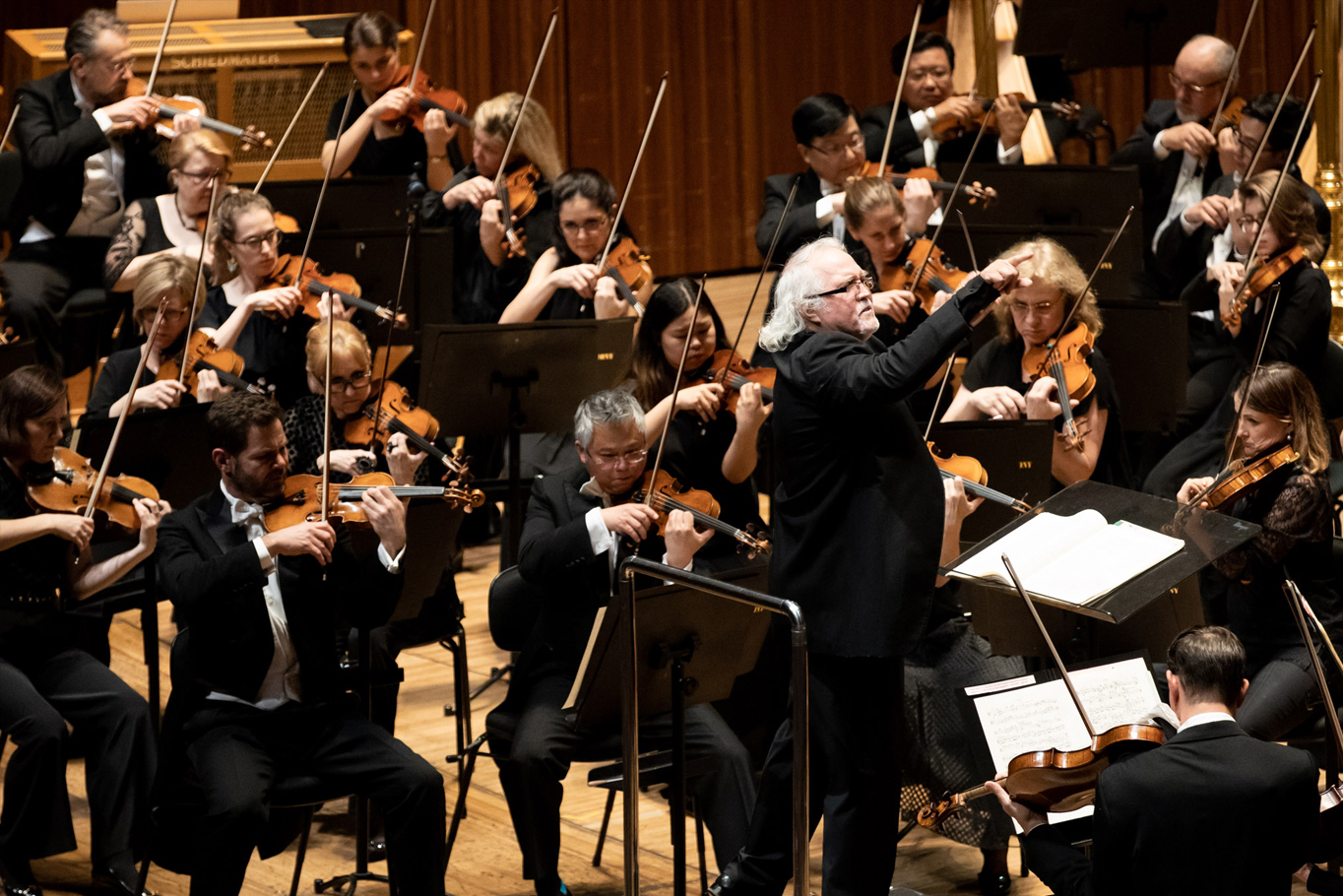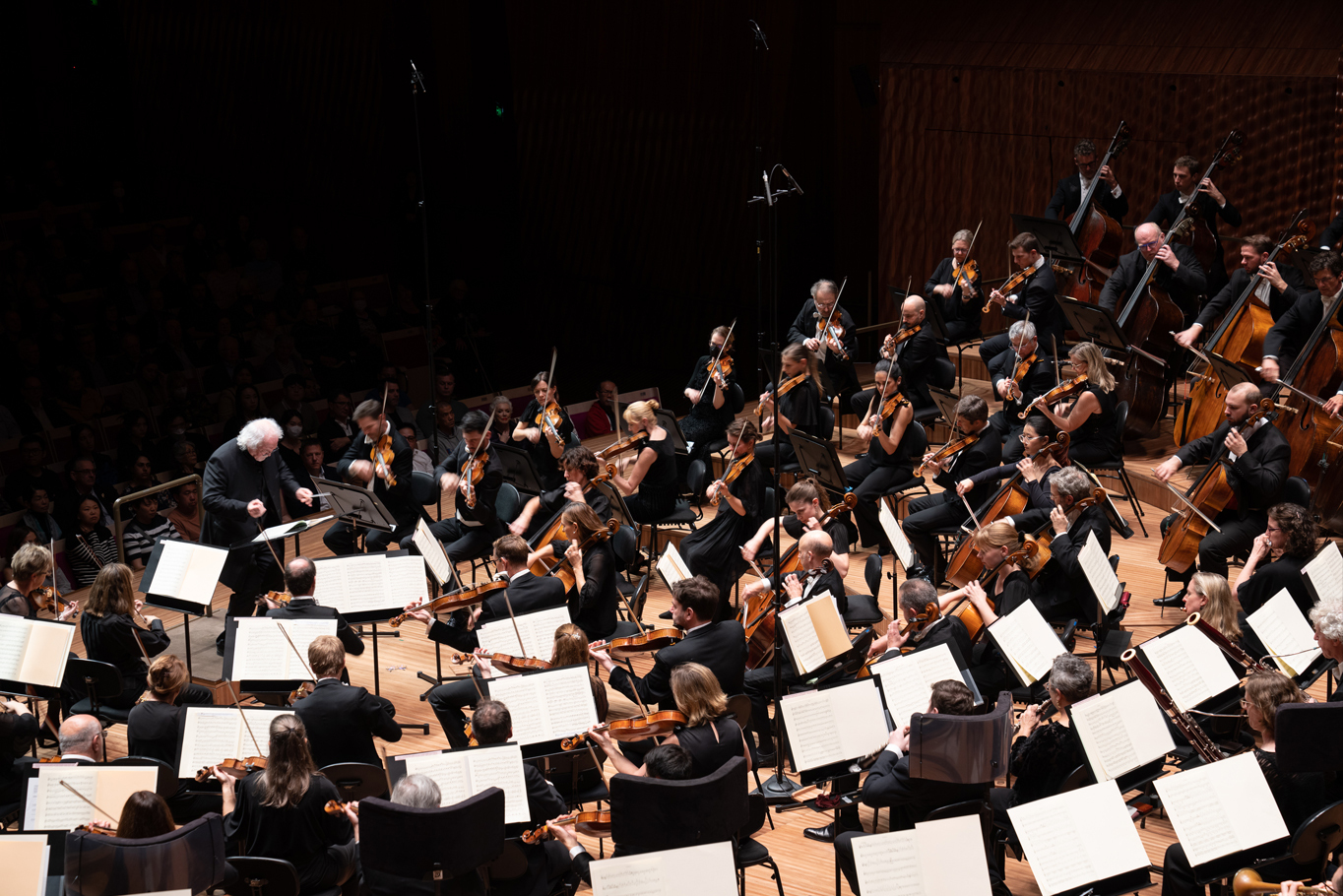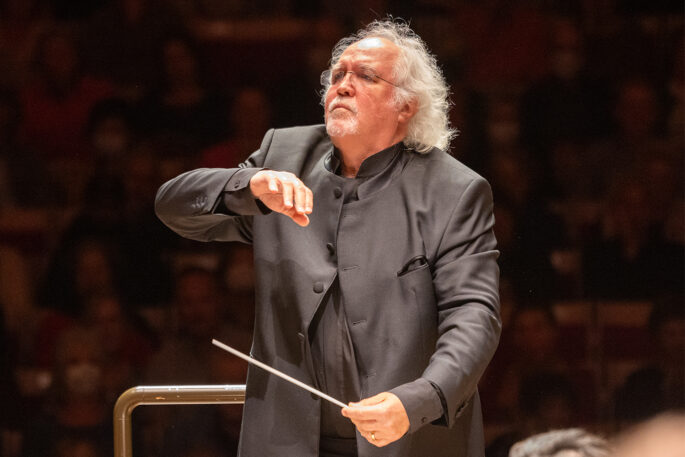
A Musical Feast Cooked Up by Sir Donald Runnicles
09 August, 2024
Sir Donald Runnicles is renowned for the way he designs his concerts, something he describes as like balancing a beautiful meal. Here he explores the musical feasts he has prepared for Sydney in September – one French, and one German…
By Hugh Robertson
‘Sydney is full of the most unbelievable restaurants. And balancing a program is like balancing a beautiful meal.’
Sir Donald Runnicles knows a thing or two about programs. The acclaimed Scottish conductor is renowned for his thoughtful and revealing programming, selecting pieces of music so that his concerts are always insightful and revealing. He might select music from a similar historical period, or within a particular musical style, but always curated so as to take you on a musical journey.
Runnicles also knows Sydney well. He first conducted the Sydney Symphony back in 1997 and has been the Orchestra’s Principal Guest Conductor since 2019, and over that nearly 30 years has established a strong connection with the Orchestra. Sitting in the Concert Hall you can see how much our musicians enjoy playing for him, but most importantly you can hear it in their performances.
Runnicles returns to Sydney in September for his final concerts of 2024, concerts that perfectly encapsulate his philosophy of programming: the first an all-French program, with music by Debussy and the rarely performed Requiem by Maurice Duruflé. The second an all-German program, with Mahler’s exquisite Fourth Symphony as the centre piece, together with music by two of his late-Romantic contemporaries in Richard Strauss and Anton Webern.
‘It’s like looking at a menu,’ continues Runnicles. ‘Generally speaking, the symphony in the second half will be with that you begin and then you decide what goes well with that. Are you looking for an antidote? Are you looking for a contrast? Are you looking for something that leads us into this?’
‘Programming is such fun. It is with any orchestra, but particularly with this relationship here with the Sydney Symphony Orchestra.’

The first of Runnicles’ concerts in September is focused on French music, and on two composers who spanned the mid-19th to mid-20th centuries: Claude Debussy and Maurice Duruflé.
Debussy is perhaps the best-known French composer of all, a creator of lush Impressionistic soundscapes that suggest rather than describe. Maurice Duruflé is not nearly so well-known, a perfectionist who only wrote a very small number of works. But among them was his Requiem, an exquisite piece of music that, remarkably, has never been performed before by the Sydney Symphony Orchestra.
‘What ties the works featured on this program together is the lineage, the sense of tradition,’ Runnicles explains.
‘Maurice Duruflé was a composer. He was a teacher. Above all, he was an organist. He didn’t write a great deal of music, but what he did write is utterly memorable. [And he] wrote very enthusiastically about his connection to Debussy, and what he saw as his very French inheritance.’
That inheritance was a distinctly new path for music, which Debussy had paved in the late 1800s. For almost 200 years music had been dominated by German composers and an approach to music that was strictly linear: a musical idea or phrase is laid out, developed in various ways, then resolved – a structure broadly known as ‘sonata form’.
Debussy, though, had a different idea.
‘[For Debussy, music] didn't have to be symphonic. It could be just beautiful. It could just be a chord and then another chord and then another surprising chord. The beauty of something in the moment.’
Debussy [was an] expert painter in sound.
‘And you feel that colour. He adds a little blue, a little turquoise, a little pink. You can exist in the sound world in the middle of a Debussy score. And there's a feeling of foreground and background, and it's all through just the orchestration.’
‘But it is just a love of colour, a love of the moment, something ravishing. Some of the greatest, most sensual music there is is French music…and I’m in love with all things French.’
Duruflé’s Requiem has a similar sense of heady atmosphere, a swirling and engrossing piece of music that belies its origins – it was originally commissioned by the French Vichy regime during the Second World War, and he was still working on it when the regime collapsed and the war came to an end.
‘This is a requiem like no other requiem,’ says Runnicles. ‘When one thinks of the requiem, you think of Johannes Brahms, you think of Giuseppe Verdi, where the Dies irae, this feeling of the day of judgement, the terror, the violence, this apocalyptic aspect of the requiem is so front and centre.’
‘With Duruflé…after the overwhelming trauma of the Second World War where a world was destroyed yet again…I genuinely feel that he could not put into music, nor did he want to put into music something violent, something apocalyptic.’
‘It’s not a long work,’ he continues. ‘It’s a very modest work. And the music is intimate. It is quiet. There’s great joy, there’s great beauty, there’s great sadness in this. And I’m very excited to be featuring this work for the very first time with the Sydney Symphony Orchestra.’

The second of Runnicles’ concerts in September plunges us deep into the rich soundworld of three great German composers of the late 19th century: Gustav Mahler, Richard Strauss and Anton Webern. Music doesn’t get much more lush than this: the orchestras are enormous, the sounds they produce are vast, and the emotions are all-consuming.
They have certainly consumed Runnicles.
‘I wish I could describe what draws me to the music of Gustav Mahler,’ he says with a smile.
‘It all started in Edinburgh when I was selling programs at Usher Hall, which is the hall in Edinburgh. Leonard Bernstein came with the London Symphony Orchestra and performed Mahler's Resurrection Symphony, the Second Symphony. And it changed my life.’
‘I just knew that I want to live in that sound world – literally, viscerally. And that's where my lifelong obsession with the music of Gustav Mahler began. And I know I am not abnormal in that – I share that addiction with countless others.
The centrepiece of this concert is Mahler’s Fourth Symphony, written at the turn of the 19th century when Mahler was at the peak of his powers. For those who have heard Chief Conductor Simone Young conducting Mahler’s First, Second and Fifth symphonies in recent years, the Fourth is rather a different proposition: it is shorter in length and doesn’t use quite the same enormous forces as those other three.
‘It is a joyous work,’ says Runnicles. ‘There's something very childlike about it.
‘The heart of the work is the third movement – it's blissful, peaceful, deeply felt music. And then at the end of the movement, all of a sudden there's one of the most remarkable moments in musical history: this is Mahler’s vision of the gates of heaven opening up. It’s a breathtaking moment.’
This symphony also features a beautiful moment in the final movement when, after the grandeur of the third movement, the music drops away to reveal a soprano singing a children’s song.
‘The movement's called Das himmlische Leben, and this is a child's vision of what heaven would be like,’ explains Runnicles. ‘And in some ways [it is] the most tender and beautiful part of the entire symphony.’
The soprano featuring in these performances is rising Chinese star Ying Fang, a principal at New York’s famed Metropolitan Opera who has been acclaimed as possessing ‘a voice that can stop time’, (Financial Times). Runnicles says Sydney is in for a treat.

‘She is a remarkable soprano,’ he says, ‘I worked with Ying last March and was just blown away by how good she is – so powerful, so wonderful. We talked afterwards about what we might do next, and I suggested the Sydney Symphony which she was very excited about.
‘We agreed very quickly on the Mahler Symphony, but that’s just one piece – which is why I will feature some of Richard Strauss's beloved orchestral songs.’
Strauss’ orchestral songs have an exalted place in the repertoire, especially for sopranos, made especially famous thanks to legendary recordings by Jessye Norman, Kiri te Kanawa and countless others. The songs Runnicles and Ying Fang have chosen to perform in Sydney were all written between 1885 and 1899, not long before Mahler completed his symphony, and is every bit as breathtaking and lush as that larger work.
And as an entrée to this musical feast, Runnicles has chosen another work written at around the same time – Im Sommerwind by Anton von Webern. Webern is best-known for his devotion to twelve-tone techniques, together with his mentor Arnold Schoenberg and his colleague Alban Berg, which set music off down a new and challenging path in the 20th century.
But just as Schoenberg was capable of the extraordinary Romantic epic that was Gurrelieder, so too was von Webern capable of heart-wrenching, exquisitely Romantic music.
‘Anton Webern was a teacher,’ explains Runnicles. ‘And as he set off in a completely different direction – quite atonal and radically different – he spoke to all of his students and said, “Before you go down that radical path, you have to go down the more normal path. You have to show that you can write in a tonal way.”
‘Webern wrote this when he was very much under the spell of Richard Wagner. It’s idyllic. It's about this feeling of his response as a composer to nature. It's so beautifully Wagnerian. It's also quite Mahlerian.
‘It's so gorgeous, so exquisite, so well-written, and it leads to the music of Richard Strauss, which then leads to the music of Gustav Mahler. And I think it has the making of a very special evening.
‘I hope the audience appreciates and enjoys it as much as we've enjoyed and appreciated programming these pieces together.’

